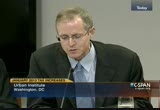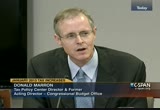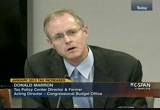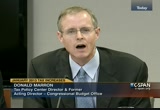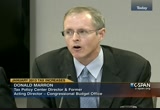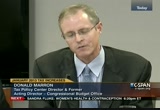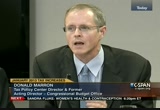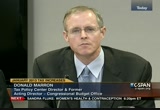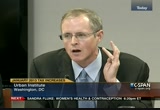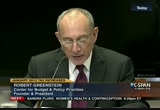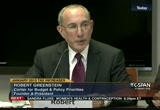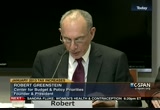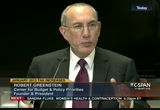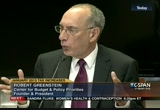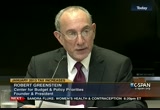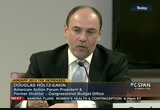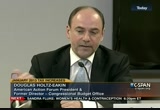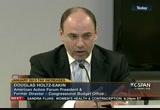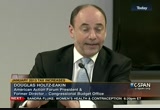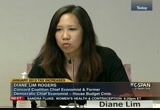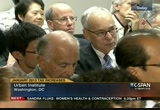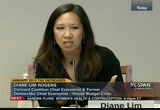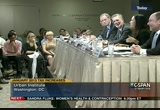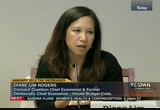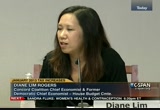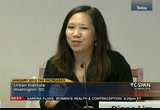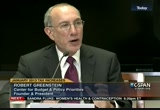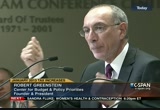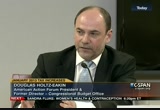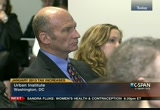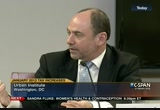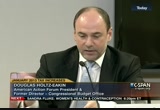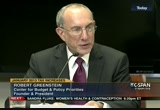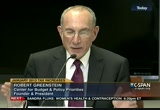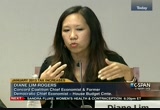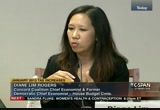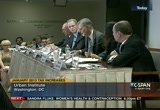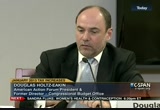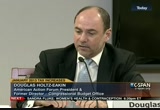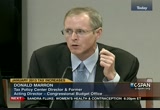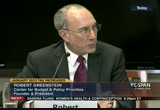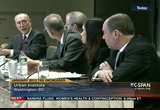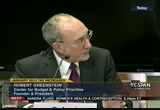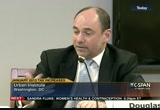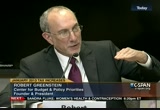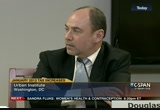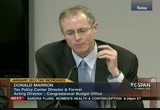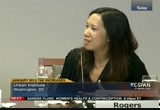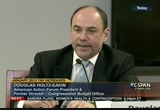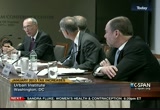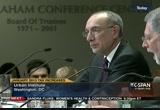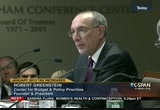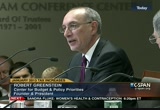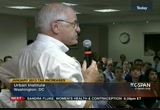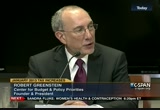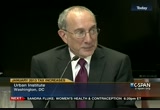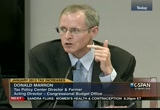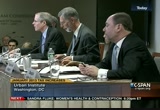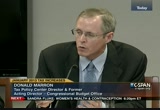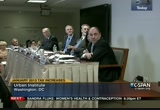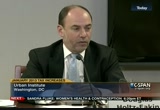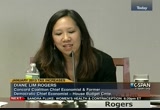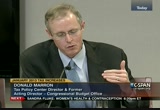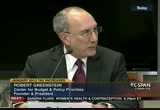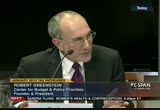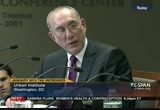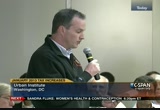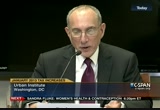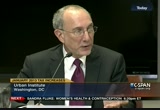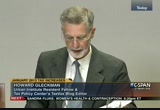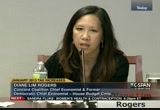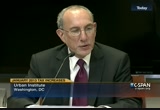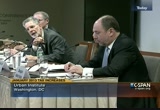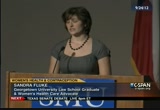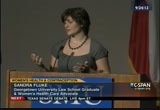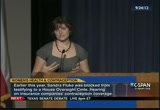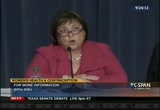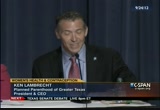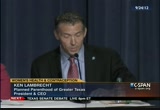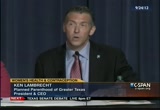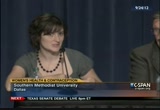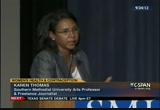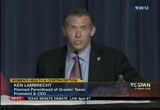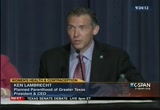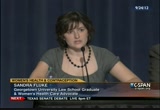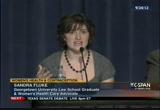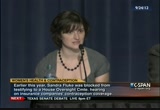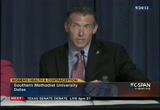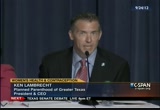tv U.S. House of Representatives CSPAN October 2, 2012 5:00pm-8:00pm EDT
5:00 pm
eakin, with the american action forum, and diane lim rogers, who was chief economist for the concord coalition. our format to they will be relatively straightforward. each -- our format today will be relatively straightforward. each will have about five minutes. we have people watching. if you have questions, please send them, and those questions will come up to me. >> banks, everybody, for being here. -- thanks, everybody. as howard mentioned, a big report about the tax components
5:01 pm
of the fiscal cliff and what the effects could be on american households. i want to make five basic points that we raised in that study. the fiscal cliff really is big. it would be more than $500 billion in a tax increase. this works out to a tax increase of more than 20%, which is very large. looking at whether this would be the largest tax increase in history. for the average household, that works out to about $3,500.
5:02 pm
someone who earns around $50,000, it would be somewhere in the neighborhood of $2,000. the second point is it affects virtually everybody. close to 90% of households would see their taxes go up. there are a few folks out there, primarily older seniors and citizens who do not have children who might not be affected, but the vast majority of american households would be affected by going off of the cliff. the first order for business is running through what the effects will be. those of you in the room have a handout that summarizes things. those of you at work and at home
5:03 pm
should be able to find this on the website. >>, a typical household looks at an increase of about $2,000. that works out to be roughly the same increase in tax rates for people at other income levels. the lowest income levels and mckeown a qana -- mittal and median income levels with around a 4% increase in tax rates. the folks in the lowest quintile with regard to about $400. the high end of the income distribution, the people in and out the top 1%, there's goes up to about seven percentage points. the top 1% earned a very large amount of money and the reason
5:04 pm
why the largest tax increase and percentage terms was up there was focused at that level was because of the act of 2003. it is big. it affects almost everybody in america and it varies by income level. if you think about the components of the cliff, we have now been in america debating a temporary tax cut for a dozen years. go all the way back to 2001. over that time we have accumulated a sort of snowball, a gigantic list of things that expire at the end of the year, plus new taxes that come on. in rough order of magnitude, the tax increases enacted in 2001 and in 2003 are about half the story now. you should not view the debate over the fiscal cliff as just being the debate over the bush
5:05 pm
era tax cut. we also have a series of taxes called the alternative minimum tax, preventing many families and a of from falling into what is a surprise second tax systems. about 20 more american -- 20 million more american families will fall into the amt. there are individuals that have been, -- become known as the extenders. i generally refer to them as the expires since they are set to expire. but in washington get to be known as the extenders. in 2010, there was a revised version of what the estate tax looks like. that expires at the end of the year. in 2009, president obama took office and the stimulus act
5:06 pm
included new credits that were primarily focused on low-income families, also those with kids in college. those were extended through 2010 and expire at the end of the year. in addition to all of those expiring tax cuts from a fiscal and economic point of view and everything we have more including the 2010 health reform act. when you look at debate over the fiscal cliff, there is actually a very diverse array of tax discussion. at the low end of the income distribution, for example, the credits that were enacted in 2009 turned out to be very important, as does the deborah cut in payroll taxes. the temporary cuts seem to be
5:07 pm
important for those in the middle range -- middle range of income. if you go to the high end of income distribution and the 2001 and 2003 tax cuts that affect high-income folks, there are also the health reform taxes that are important. there are different components of the fiscal of that are particularly important. if it is important to note that the payroll tax-cut was always intended to be temporary. you want to distinguish between those that will likely go way
5:08 pm
verses the ones that folks are debating verses the ones that are unlikely to end, including the amt pike. if you think about the challenges that we face in our tax system, one of the ones that are the most frustrating as a policy matter also have economic consequences. if in a deep sense we do not know what our tax code is anymore. and when we emerged from the fiscal live, we need to get to is a jewish war we actually know what the tax code is.
5:09 pm
>> as we all know, there are really to risks and here, the obvious risk to the economy and the short-term -- and in the short term, cbo said that if all of this item good demand comes out of this economy, then we will have a mild recession in the first part of 2013, but would be back in recovery by the second half of 2013. but a recession on top of where we are already certainly would not be good the even bigger risk is the risk to the economy long term if we continue to kick the can down road and do nothing about our fiscal problems. how do we think about these two things? there is an interesting report that came out several months ago from the carlyle group. i just want to briefly read out what it has concluded. every analyst would have a grand bargain that replaces the cliff
5:10 pm
with a credible alternative the faces in a reduction over a time frame of years. but in negotiated settlement failed to realize the lame duck. those -- the most likely alternative may be a simple extension of fiscal policy. while such an extension would include the near-term growth prospects, it would also relieve the pressure to substantially worsen the longer-term outlook. it might mean the expiration of current fiscal policies to encourage both parties to work together and quickly reach a grand bargain. i am with carlyle and moody. we would all prefer and out come in the lame duck. but if we cannot get it, going into january is less bad than extending everything and doing nothing.
5:11 pm
cbo did not say that we go into recession on january session. -- january 2. the 500 billion comes out over a timeframe. it does not come out the first week in january. if sequestration goes into effect and stays into affect, we will go into recession. it is from an economic standpoint a slow, rather than a cliff. if it is a cliff, you go over the end and you are dead immediately. the farther you go and the more demand that comes out, the bigger your problem is. the only reason we have a fiscal cliff in the first place is a biblical impasse. you can spread blame around and
5:12 pm
both parties are going to have to move. but let's face it, in the negotiation in the past years, the a single biggest obstacle to -- not the only, but the single biggest obstacle was been republican unwillingness to move on taxes. if they will move on taxes, then democrats can give some on spending and they can have some movement in the lane? . what happens if we do? think of 1995. and we had a government shutdown. the pressure on both sides was so intense ones the government shut down that they had a deal within three weeks. the market consequences are more significant out.
5:13 pm
it is inconceivable that if we go into january there will not be a settlement in january, early february, the latest. we hit the debt ceiling -- sealing interviewer it anyway. one side will have to blink. probably both sides will link to some degree. i have talked to people in financial markets in new york about how they would react to all of this. a lot of reaction is that if there is any deal, it will make our directive to january 1 those tax cuts and we will remove sequestration. what i am being told is that in the interim, the damage will not be that significant. for fiscal hawks, many of us have been saying for years, when
5:14 pm
do we get action? if it happens in december, that is better. if it happens in january, that is significant progress. i think they said it very succinctly. carlisle and azande wrote, ideally, policy makers that they would work around the economy while making changes to fiscal stability. such nirvana may not be achievable in the lane duck, but it will be early next year. the current tax increases and government spending cuts probably have to lighten up a bit to generate consensus between the two political parties. i hope that is not right, but if it is, that is what we need to do. i assume you a -- >> i assume you agree with everything bob
5:15 pm
just said? [laughter] >> and bob is right that you have to sort through these issues, and i think he has come to exactly the wrong bottom line. on the cliff itself, this is an extreme danger to the economy. everybody has their own numbers. you put together the tax increases and spending cuts, and it is something like $640 billion in our calculation. it is something like 4% of gdp. we are looking at 1.5% at best. and you do not have to be a genius to figure of the consequences. we have a recession, and probably more severe one than the cbo said. and it is not just in january. it is already happening now. new york is already seen the implications of the eminent fiscal cliff affecting the economy we have seen a lot of
5:16 pm
anecdotal reports of businesses looking out the weaker economy and scaling back their plans. the defense contractors must send out notices so employees will be laid off. if you are a dividend investor and you are looking at, tax breaks january 1, you are broglie's starting to worry about the market. this is not some that will wait until january. it is already harming the economy. if we wait for a fiscal cliff, it would be responsible. if you look at the pieces of the fiscal cliff, there is consensus
5:17 pm
that is going to go away. i consider it inconceivable that we will get rid of the affordable care tax between now and january 1. that is another tax that will be there for sure. that places a premium on the rest of the tax hikes and spending cuts. the sensible thing to do is to say to congress, you know, your strongest instincts, a thing in your dna into kick to thin down the road, please do that. when you get to the sequester, the $109 billion in across-the- board spending cuts and by and large, that is horrifically bad policy. that has to be gotten rid of,
5:18 pm
the question about tax policy. it has done horrific things. the only thing to remember is that there are only three different problems. problem #one is the fiscal cliff. it could come early next year, maybe as late as march. problem #3 is the path is unsustainable. it is dangerous to america. we should not conflate those. we should temporarily passed this fiscal cliff. we need to clear the decks to deal with the big problem.
5:19 pm
the rating agencies has already downgraded the united states. if we do not make any real progress, right after an election and everybody is trying to deny, if they cannot make progress, then the problems are still toxic. you do not need causing a recession as a threat to force us to move. we should get past the fiscal closed. and then get to the fundamentals in this grand bargain that would forever get rid of the fiscal cliff.
5:20 pm
that is the best way to go. >> and diane? >> the way we got here to the fiscal cliff was a bunch of cans getting kicked down the road. if you look at the cbo analysis of the fiscal of, you realize the scary part is the can that happen to be in the road in front of us right now. there is a good part of the cliff, and that is the part that stretches on through the 10-year budget window. that is something we call the baseline and the cbo analyzes about. at the cdo talks about how going over the fiscal closed at the end of this year would likely bring us back into recession. i think that is very important
5:21 pm
to hold onto because we have been in the habit of kicking the can down the road. i'm here to say we should not just kick the can down the road again. we should not just try to substitute with the simpson vols and other proposals. it is just too hard to do that. i am proposing that instead of substituting the fiscal cliff or ignoring it to that we recycle the fiscal can. all of those things go cans represent policies that we were willing to commit to in the
5:22 pm
past, that legislators passed. they committed to those things expiring. they chose to kick the can, whether come to entitlements are spending cuts. let's not just take them. let's not just ignore them. let's keep them. here is what i mean. recycle them. look at the competition in terms of our spending cuts. they are all very doable. the pile of the cans is not harmful as it stands let's
5:23 pm
commit to using those cans along the way to put in place policy that uses every element of those cans. if the taxes increase, then is a tax increase. if the canned says tax cut or mandatory spending or discretionary spending, we would use it in that way. achieving these baseline pounds of revenue and spending, it is not necessarily in the exact timing or form that the current law baseline looks out right now, but sticking with the essential elements. those of you who know me know that i am quite fond of the current law baseline. in the past i have said what we need to do is to follow a strict pay-as-you-go. i am tired of exempting this and ignoring that. let's stick to strict pay-as-
5:24 pm
you-go. pay-go noit to exceptions. i will just modify that today and say instead of pay-ago, is re-go. recycle as you go. set targets that congress says, by this date, we will have achieved this goal. the budget committees and the budget process to enforce this. there is something called budget conciliates -- reconciliation where they've direct the budget and other entities with jurisdiction over the program to come up with reforms, for spending targets. the announcement we need is what
5:25 pm
tells us whether we want to use this can like this, or do we melt it down and reshape its four different parts of the whole system. if we want to give tax cuts low, we need to broaden the base. and what are some different trade-offs? how much will i have to broaden the base? what are the most progressive elements of that? tax laws will be busy in the next year is what i predict. what we need to do is to keep asking ourselves the question as we go along, are we using all of these pieces of fiscal policy to the best of our ability, and to their best purpose? and ideally, which come out of this 10-year budget window, you know, driving this fiscal policy
5:26 pm
machine instead of just getting stuck with a junky pile of cans. >> now that we have consensus, -- [laughter] let me ask youtha first, is it unfair to be cynical of policy at this point, especially since doug was suggesting that sequesters, have gone away. how do you get these guys to do that? >> at the concord coalition, the way we view this is you have to create a lot of public sentiment for this kind of discipline. this is not something that we can quietly sit around and held for. yes, you have to be optimistic about my point of view.
5:27 pm
it is hard to do a good tax reform. it is time consuming. it is hard to do an entitlement reform. we will not want to rush into anything, but we have to create some boundaries. what has been happening for over a decade has been that deficit financing is the easiest thing to do. it seems free to people. unless we hold congress to budget constraints, and until the american people told congress to budget constraints that are necessary, we will not make progress. the idea, i guess, i know there's a high probability that a can will get kicked again, but i think we have to put pressure on this notion that if politicians really care about being fiscally responsible, they have to actually follow through on their claims that is what they want to do. >> donald, what do you think? you think that congress can do
5:28 pm
this through a well-organized process, or does this have to happen in a grand bargain that happens relatively quickly? >> it is fun to talk grand bargain. i have been with many of those conversations. it is fun to gather people around the table and give them pizza and coffee and hammer out the grand fiscal bargain. there are several of them out there in various levels of detail. but it remains difficult for me to believe that congress is ready to get there yet, or frankly, that the american people are ready to get there yet. there are deep-seated visions of what the role of government is and how she and -- how big it should be. and until we strike a compromise on what those ideals are, it is hard to get to the grand bargain the simultaneously addresses entitlement and tax reform. >> you do think there's a possibility of a grand bargain. you see more optimism? >> there is more possibility of a two-stage bargain.
5:29 pm
in stage one, which is more likely in january and december, if you have what is called a down payment. you enact some entitlement savings and some revenue increases. the two parties have to agree on a dollar amount in those areas that they will then produced by more detailed legislation. presumably, for the same day in revenues. and here is the hard part. you have to have an enforcement mechanism for what happens if the committees do not reach the legislation targets. that is the really hard part to do. your chances are increased if you have parallelism. you have significant numbers on
5:30 pm
both sides. they live in the same time frame and they are linked together, so republicans don't get the tax decreases without swallowing some spending increases and democrats don't get tax increases without swallowing some of the spending cuts. the bang for the buck on a lot of high-end tax cut is less than 50 cents on the dollar. and a lot of the spending is higher than 50 cents on the dollar. it would also not make a lot of economic sense. but my point is that you must have pearland some -- parallelism or you are not going anywhere.
5:31 pm
>> i think you need to be very careful about what kind of expectations we have a of a lame duck. the big deal will include tax reform entitlement reform, because god has it right. both sides will not touch it until they are sure they are getting -- republicans will not touch unless they are sure they are getting tax reforms and democrats and vice versa. yudof to pick the amt and figure out what you are going to -- where you're going to be. that is the first problem. the second problem with the lame
5:32 pm
duck is if you are trying to settle the long run nature of our entitlement safety net, whoever has been advantaged by the november elections will say, let's wait until spring when our guys are in the seat to make these deals. and the third thing is, during the lame duck, they are holding leadership elections. and you will simply not see people say come and go in and vote for me and i'm about to have a big compromise with the enemy. it is a terrible environment for the deal but needs to be done. it acknowledged the reality. let's do the deal in 2013, but not cause a recession. intact.pe we get 2013 that is our role. >> as long as the discussion about tax reform is an ongoing argument about the bush tax cut common i am so tired -- the bush
5:33 pm
tax cuts, i am so tired of the bush tax cuts. i think most people would agree. >> that is exactly the point. as long as you have extended the bush tax cuts -- and as donald said, only half of this is about the bush tax cuts, but in the public discussion, it is the bush tax cuts. as long as you extend them, can you get out of that debate? conversely, if you let them all go, does the change the framing of this so that we are not talking about the bush tax cuts, but just the tax code. >> i 100% agree that we should talk about the tax code. and as donald pointed out, we should know what the tax code is and is something that we should believe in. it is long overdue. it is dangerous economically to let it go at the end of the year. if we are so irresponsible tuesday, let's voluntarily enter
5:34 pm
a recession, we will not fix any of these problems. congress is simply not capable in a recession talking about raising taxes, spending cuts. it is the wrong environment. there are day -- there are ways to deal with this. i would be thrilled with the fact that we have some special processes. the house passed a bill that extend the tax code for a number of years and pears with that the fast-track legislation and replaces discretionary cuts across the board with a longer- term reduction of mandatory spending. it would be nice to see senate come up with something and go to congress and hammer this out. that is a way to do this. the tax reform, as i mentioned, is really hard the 16th
5:35 pm
amendment will be 100 years all and in those 100 years, we have had less than a handful of comprehensive reforms. the notion that we will do that in the lame duck is insanity. it will be hard to begin with. we should abolish the, reach what we can that is possible, and get reform done -- we should acknowledge that, reach what we can that is possible, and get reform done in 2013. >> doug is really knocking down a straw man. nobody is suggesting that in a lame duck or in january we are rewriting the whole tax code. as for the bill the house passed that you referred to, that is a joke. and look at what it does. it extends -- we have a weak economy. what does it do? it extends the bush tax cuts and it lets the tax cuts for lower
5:36 pm
income working families expire. why would you let those that to, that ishave the highest pae buck to expire? but fundamentally, there is another issue here. as i have said, you do not go off a cliff into recession on january 2. but if you default, the hour -- a the reality is, if you were terrified about the economy there would have been a one-year extension of the debt limit the debt limit was a neck -- a mechanism to drive all spending cuts with no revenue increases. now that the issue was on the other foot there was an
5:37 pm
extension. there is a lack of parallelism where you approach the income tax cuts were there is a slow. >> diane, does there have to be this parallelism? >> i think there is a mixed in the 10-year window. obviously my favor a revenue heavy approach. that is not a secret. at 91% of the one-year fiscal cliff is revenue increases. the spending cuts are a small fraction of the size of the one- year cliff. i think it's a balanced approach is necessary in order to get
5:38 pm
bipartisan cooperation. but i think the way to enforce that could be by coming to an agreement about the basic parameters, how much should come from revenue increases versus how much should come from spending cuts. i do not necessarily think that substituting current law would something like samson bowles is the way to go simply because it is not just a mix of spending cuts and revenue increases in a sense of balls. it is a particular form of the reform, like it makes certain assumptions about how successful we will be at base grounding, which i do not really believe will come true. and it does not respond very well to the changing its economy year after year. i think the recycling the can
5:39 pm
approach that i was talking about, you take it one step at a time and you adjust it. you make commitments to a certain amount of deficit reduction, but you are able to tailor your policy needs in the economy at the time. a certain amount of revenue, is supposed to increase over the next 10 years. i can -- and you say, is this too regressive of a can? should we find a different form of this can to do a less harmful form of revenue increase even right away and then maybe letting low-income tax cuts in for example. i think makes is not so hard to come off with. we have not seen a package that is acceptable to both democrats
5:40 pm
and republicans on actual policy. it is surprising, because i would say that even the tax reform requirements, you would think the republicans are in favor of reducing taxes. but you would be surprised at how many democrats do not like the details of revenue-raising and how many republicans do not like the details of spending cuts. i think we are very far away from moving through the idealistic version of sims and bowls, but -- which i love, but i do not think we are anywhere close to realizing the specifics of those plans. we are very far away from that and actually getting to an actual plan. >> neither candidate wants to talk about the specifics, and get even close to talking about
5:41 pm
5:42 pm
the lame duck would be the second worst and for all the reasons that i outlined i think it will be very soon begin to do the little that you can get done and then get the reston next year. the rock to be great leadership out of the white house to get this done -- there will have to be great leadership of the white house to get this done. it is going to be difficult. there will be lots of up days where it is going to look like we will not make it. we are never very pretty when we are solving big problems. next year is the time to do with. that is the core of my argument. and it does need to be done, and a question. you will not decide those big issues of the tax code and things like that in the lame duck. it will wait until next year. >> what sigel would you like to see from the presidential
5:43 pm
candidates to move this process along? would you like to hear them say there tomorrow night or over the next five weeks, what is coming down the line? >> i would like them to say we, meaning the white house, the senate, and the house, have a fiscal cliff that we should solve, not a a "de" have a problem. and then point fingers. -- and not "a they have a problem" and then point fingers. there should be highlighting of the dangers to the economy. and once you get to spring, you have to commit to the two things that we do not lie, which is raising taxes and cutting spending. politicians hate to say that. >> and diane? >> i totally agree with that. i think we need to hear from the candidates that they are serious about getting deficits down to economically sustainable levels over the next 10 years and they
5:44 pm
will not allow a short-term fiscal cliff to derail the economy, but that is not another version of them just saying they will kick the can of down the road again. i would also like the default position to say that we defer to what is in current law. i would like that to be the default and then business as usual. >> god, what would you like to hear out of the current candidates? >> if you think about policy in a lot -- donald, what would you like to hear out of the current candidates? >> if you think about policy in the last few years, government shut down, pending default if we would have got over the debt that -- the debt limit. there was action to force congress to act, but no pain associated. so nothing happened. now we are the fiscal clift that will aspirational a force action.
5:45 pm
the thing that would be nice to see our leaders do, including whoever is going to be president, is to switch back to a model of leadership rather than just responding to crisis. >> i someone at disagree with some of the other answers in the sense that i think both candidates are already doing lots of rhetoric, saying this is a really serious problem and we have to address it. the criticism, britta gilley on the brahney side -- particularly on the romney side is a lack of specifics. i do not say that in a partisan manner. the president has to submit a detailed budget. the obama budget has been scored by the cbo and has a 2.4% deficit-reduction in the next 10 years. you can argue over what you think that is enough in not to stabilize the debt to gdp ratio but conversely, i'm not actually
5:46 pm
sure i would want to see ronnie detail all of the tax expenditure changes he says he will come up with. the problem, of course, is betting campaign, if people -- is tt in campaigns, if people start putting out more detailed proposals, demobilize the opposition. this is kind of like the 1993 securities commission. the two parties can hold hands and they do not start out being a brahney proposal or an obama proposal or a republican proposal or a democrat proposal. i am interested in what is in the debates in the next four weeks -- i am less interested in what is in the debates in the next four weeks and then what the vendor does in the weeks after the election. >> why would you like to hear --
5:47 pm
what would you like to hear obama say in the weeks after the election? >> we are not going to have a deal that does not have revenues and spending. the biggest obstacle is on the revenue side. i believe i have asked democratic senators if my perception is correct, and they say yes. republicans keep thinking that in the 11th hour, democrats will relent again. one of the things the president has to do is to make it crystal clear that he is damned serious and he will not accept the deal. let's just this lay that out there. once that becomes accepted, that is my fear of war we go into january. i think we will have to go into january because republicans will not believe it until then. that is the predicate to getting
5:48 pm
a bipartisan deal. >> i want to follow up on an issue that daud raised on a panel with a group of economists. it is about behavioral response to the looming fiscal cliff. you suggested that we are already starting to see some response. >> i think so. the notion of the slope is incredibly myopic. it only happened in january and the impact is only felt in january. they anticipate things and they are anticipating it now. they will anticipated even worse unless congress makes a deal. you have to acknowledge that and for the same reason, they are out of time to get the big deal next year because people have seen this movie before and if
5:49 pm
people don't see a clear deal, then bad things robin -- bad things will happen. >> i think daud is confirming my point, even though he says he is disputing it. >> we are on the very early stages of a slow right now. if you are an agency head and the federal government and your looking at the potential for sequestration, i think many agency heads are not spending a full quarterly rate and then in october and november and december, you will be more cautious about letting some of those new contracts and some of those things if you are worried about production in january. i think it is a slope. it is not a slope that starts january 1. there are the beginning pieces of it now. it is not that the world
5:50 pm
changes overnight at midnight on december 31. >> it does a, because at that point you will have definitively proved that you did not get a deal. and right now, it is still uncertain. >> remember 1995 when the government shut down? >> it is not the same. >> the pressure will be greater here. if we get to january 1 trapeta -- january 1, maybe the president lets people watch the football games on january 1st or maybe not. by january 2, everybody is negotiating at the white house and everybody is negotiating every day. i would think it will be more intensive than in 1995. and both parties will be attacking the other, but they both will be saying, whenever going to do a deal that we can
5:51 pm
make retroactive to january 1. i'm not saying there will not be market volatility. and i'm not saying the slope is not have a deeper incline after january 1. it does, but it is not wiley coyote -- wile e. coyote falling off the cliff. gregg's and do you think there will be people selling stock in advance of january 1 -- >> do you think there will be people selling stock in advance of january 1 because they see this? >> a lot of the behavioral response depends on what is actually in people's minds. at the end of this year, if people believe will go off the fiscal put, it will induce people to do tax motivated things. if you're a lucky person who has a bunch of appreciated stock, maybe you bought apple a few years ago. maybe you would like to contribute to the tax policy center. [laughter]
5:52 pm
your current rate will go up from 15% to 20% next year. if your a highly compensated person, or you run a firm where employees are highly compensated, are you going to have incentive to pay your employees bonuses in this calendar year or next calendar year? it might make more sense to do with this year rather than next year. i do not want to oversell these things of great microeconomic import, but if people think that tax rates are going to go up, particularly at high income levels of significant amounts, you should see a lot of activity trying to gain that before those rates take effect. >> i think most of the behavioral response you will see is timing. and everybody will wait to see what happens. i suspect there is more uncertainty about whether there is more doubt in people's minds that we will actually stick to
5:53 pm
the fiscal cliff and all of the rest of it for 10 years that there is that we will avoid the fiscal class. i would guess that there is a fairly narrow range -- and the paper you put out yesterday will .elp people's expectations i would guess that people would count on congress getting really discipline and sticking to going over the cliff. >> i have to respond to bob. the person who made the case for extending current fiscal policies for the united states, in 2010 when the economy was growing more rapidly than it is
5:54 pm
now, they said it is dangerous to have taxes go up and we should extend for two years the current tax rates. this is the same argument, but it is the current tax rate plus a lot more. on the politics of who is holding out, i'm sure they would raise taxes in a lame duck if democrats would settle on medicare and other things. that is to be safely navigate it's a bad deal can be struck in 2013. >> -- navigate that the deal -- that is to be safely navigated so that deal can be struck in 2013. >> we have a question in and that i think is appropriate for bob. if they do not address the fiscal cliff in december, how quickly, in other words, could
5:55 pm
the new congress move? you seem to suggest very quickly, but there is an organizing issue here. >> not necessarily. >> if you think of this as a two-stage process where you have a framework bill first and a detailed bill that makes the detailed changes in the tax code that makes changes, say, in the cost structure or the underlying premium structure of medicare, no, i don't thing that will happen in january. that would be where you start a -- you set a dollar target and that could happen in the second phase or something like data. -- like that. for the framework bill, think about the budget control act that was worked out in august of 2011 we were approaching the debt limit. that did not go through the normal committee process. that was negotiated by leadership. if there is a framework bill, it
5:56 pm
will be similarly negotiated by of leadership. as long as it does not get into the details of rewriting the tax code and have some targeted down payments on the kinds of things on the entitlement side, i think you could do that as such a process. but you would clearly need to the committees for the second. >> let me also ask you, bob, if i can -- i don't mean to pick on you, but i want to follow up on something that i think doug said at the beginning. and you have a leadership, particularly house republican leadership to be specific compaq -- to be specific, ken john boehner -- can't john boehner say he will make a deal with barack obama even though he
5:57 pm
is in the middle of an election? >> that is a good question. a leading player in texas who is now on k street, but more on the debt -- the democratic side. in a conversation, the republican said, the democrats will have to to -- will have to cave on taxes because john minnert cannot -- and john painter cannot move his caucus before january 1, but the president can rollover before then. i think we see this as a prescription for never getting anywhere. the hope is that after the election, the discussion proceeds in such a fashion that there can be agreement in december. but i think the very point and you mentioned is one of the
5:58 pm
reasons that it is more likely we get a deal in january than december. it is precisely because of what you just mentioned about john boehner and the elections in the house. i should state it more clearly the bottom line question is, what does it take the house republican caucus to move? i hope i am wrong on this. i believe the house republican caucus will not move on taxes until they actually see that holding things hostage and playing chicken did not work this time. the president did not cave in on december 31 and we actually go into january. i hope that is not true. that is the main reason i think this goes into january. the i do not think they will believe it until this happens. until we actually see the top
5:59 pm
36%, i think will and a big deal where there is tax reform bad produces a new top rate that is significantly lower than 39.6, but broadened the base that it still yield a significant revenue contribution over revenue reduction. >> i agree to disagree. it is misreading the fundamentals of what is going to go on in the laying down. >> ok, let's give you an opportunity to ask some questions. wait for a microphone. introduce yourself. and the third thing, please don't make a speech. just ask a question. yes, sir, over here. >> i am a federal government budget person. i am retired. you talk about the businesses and federal governments.
6:00 pm
local governments lay down their budgets in january. as the economic advisor to the governor, you have to tell him what to do in his budget to portray what your state will do to deal with the problems of will come up. >> and do you do a lot of work in state and local governments? >> he raises a i think first eight budgets, i don't think it's whether you get a deal in january. i think it is are we going to have significant further cuts in discretionary spending, non- defense discretionary spending well below the budget control act, given one-third of that is to state and local governments. are we going to have big cost chefs in medicaid. those are the two biggest factors effecting state budget in terms of what the fed -- in
6:01 pm
terms of what the federal government does. it's hard to know the outcome until the deal unfolds. inon't know what the deal is that interim. i would tell the governor he should contact the state's congressional delegation and urged them and that we should not go below the budget control act caps and given what i view the extremely important medicaid expansion in the affordable care active finally cover millions of uninsured people, given that, you should advise this delegation to not shift medicaid costs to states when states are being asked to be expand the program. >> it seems there are pros and cons to the fiscal cliff for states. on one hand, there's the potential for more revenue of their piggybacking on the fed's.
6:02 pm
on the other hand, recession is not good for them. what do you tell them? >> a recession is really really bad and i would advise the governor's to keep an eye on that. there is some piggybacking and also, i think there is an issue for state-level folks. suppose you are in a state that has a lot of highly compensated people and they really believe we're going to go over the fiscal cliff and the engage in some of these timing things i talked about earlier. at the state level, one of the things you want to be sure to understand is that if there is a surprise surge in revenue, it is to not build into expectations of the future because the timing is very much i'm giving you things now but taking them from you in the future. >> another question -- wait for
6:03 pm
the microphone and introduce yourself. >> rick from fairfax. to questions on comprehensive tax reform. the tax policy center study the democrats are using to say middle-class would have a $2,000 tax increase, fact check said there is no evidence of that. i see that ads are still running even after fact check came out with that in virginia, which is a swing state. could you comment on that? from 2000 to 2006, the republicans -- i'm not
6:04 pm
republican, but they never had complete control, they only had an average of 52 in the senate, so they couldn't really pass any thing other than the tax cuts, they could not do tax reform, they could not to regulatory reform, they couldn't do spending reform. but, in 2009, the democrats did have 60 seats for seven months. they chose to pass the medical bill, but they chose not to pass comprehensive tax reform or fixing the so-called tax break for shipping jobs overseas. why is that? >> i will go first. as probably everyone is aware, we released a lot of high- profile studies in recent months. one was an analysis of what governor romney has put forward.
6:05 pm
it's a plan that is specific in certain regards and is less specific in other regards about how base broadening would be used to pay for it. our analysis suggests it will be very difficult to accomplish all of the goals governor romney has set out in terms of revenue, distribution, tax rates, base broadening -- i'm sure i am forgetting something else. the takeaway message of our study is that something will have to give. something in terms of a compromise in terms to accomplish these various goals. that is something you have seen folks who are close advisers to the romney campaign mentioned in recent weeks. one of their most prominent economic advisers said if it was not going to be possible to pay for the rate cut and accomplish the governor pasquale's, one way of bending on this would be to
6:06 pm
do lower rate cuts. >> do you want to tackle the second half of the question? >> actually, there was some other things and acted in the 2001 or 2006 timeframe and one that comes to mind is the prescription drug benefit in 2003. since we are having a fiscal discussion, i feel compelled to note that the 2003 health expansion was deficit-financed while the 2009 legislation was paid for it. >> other questions? >> patrick lecher -- patrick lester -- as think this was referred to indirectly but nobody said it explicitly -- republicans have been held accountable by someone who is
6:07 pm
not in this room -- grover norquist for not supporting a tax increase -- if you support it, you might get challenged in the primary. the day before we hit the fiscal clef, it would be called a tax increase. the day after the cliff, it would be called a tax cut. for political reasons, isn't it necessary, if you are going to get a balanced agreement that will include revenue increases that will also be able to command the support of republicans? don't you have to go over the fiscal clift to get that kind of agreement? >> i don't believe so. i think we have seen -- first, let me reiterate, for the budget baseline gimmick reasons and reasons of desperately wanting to raise taxes, i think these political agendas at the expense
6:08 pm
of the economy is irresponsible and we shouldn't do it. when you get to 2013, we have seen there is a template out there which will work, and we have seen republicans support revenue increases. that template is you have to do large amounts of spending reforms because at the moment of truth, the amount of revenue is detachable. you just have to follow the template and we will get to where we need to go. >> what the make of this baseline issue? >> its to bad that we have to rely on actually going over the cliff to stick to the current base line. that's my main reaction. i think it's too bad it has been so hard to raise revenues because of the pledge.
6:09 pm
especially given that there are so many ways of raising revenue. it goes back to my hope that we can somehow get a budget process in place that honors the current baseline. it and sticks to it more aggressively. >> if i could just make one budget geek comment on this, just notice that as officially scored by the joint committee on taxation, if you made up a policy that would extend permanently half of the tax things in the fiscal cliff, causing them not to happen, that would be scored as a tax cut in official terms. it is a kind of political framing issue in terms of the budget process, we are in a situation where any situation,
6:10 pm
and the extension would be characterized as a tax cut officially. >> i want to stick with the baseline issue. it's an interesting point. for example, if you think of the bowls-simpson proposal, it was described it when it came out as raising about 1.2 trillion in revenue -- a couple of hundred million dollars from the transportation package. but used was called a possible base line. it worked from a base line that exit -- that assumed the bush tax cuts that expired. when people describe it as having $2 of spending cuts for each dollar of revenue, that was a ratio that didn't count the close to trillion dollars -- close to a trillion dollars from having the bush tax cut to expire. the policymakers of both policies have decided whenever
6:11 pm
they have these bipartisan negotiations, even though they have not yet produced something, they decide to work from a current policy baseline that assumes all of the tax cut are extended. if you measure from that, we have a paper about to come out. if you take the original proposal and a look at it over 2013 to 2022 and measure the current base line, its 2.5 trillion in revenue and it is about one to one, not to 21. this confusion on baseline -- it's not just a discussion of whether a tax increase our tax cut, it is what are the numbers and what are the ratios? whenever somebody says what is the ratio, i say what is the baseline -- i can't answer the question until i know what baseline used. i have to say one nice thing
6:12 pm
about going over the cliff is we finally have a baseline of laid out. the recession may be the price to pay but at least we have one baseline. >> with a going over the fiscal clift be more or less dangerous than defaulting on debt would be? does anybody think a default on the debt is a better thing than going over the cliff? >> dramatically more a immediately damaging. >> it is a tie for last. these are two very bad ideas. [laughter] >> one of you at noted that under the forecast, if you go over the cliff, you have a recession and the short-term. if you default, there is no time -- five years from now, it's all
6:13 pm
bad. >> i think the answer is it the worst of the worst is to default on the debt, but they're both bad ideas. >> thank you. i appreciate the panel and the lunch you gave us. this is a question for mr. greenstein. i am on the staff of the senate finance committee reporting all to believe to senator orrin hatch of utah. you have said we will not really go over a cliff, but just down the slope. but i think you also said if we get into january without any congressional action, the pressure to get a deal would be so great that the deal would be forged in congress quickly. i can imagine one of those two
6:14 pm
things would be right. it seems unlikely both of those are right. if there is no fatal fiscal cliff but just a delightful slope, why would there be great pressure on congress to act quaestor >> there is any contradiction in the slightest. the notion of a slow is the father -- the farther you go, the greater the danger becomes. ultimately, the danger is great. in addition, there is a distinction between how much aggregate demand comes out of the economy of fast and how financial markets respond, which are looking to the future. i think there would be serious financial market volatility, probably before january 1. it would intensify after january 1. i think that would put a lot of pressure on. the was a lot of pressure on both parties when the government shutdown in 1995. comparing the consequences of going over the cliff to where
6:15 pm
things were when you couldn't get a passport and visit the national park and the federal employees didn't return to work, these are not equivalent. i think the pressure would be overwhelming on both parties. >> one more question. >> you talk about these and the financial markets -- have you taken into account the international reaction, particularly among the chinese and europeans and our interest rates by people who may not have the benefit of the clarity which you address what is going to happen on december 31? >> that's an interesting question. i'm no expert on international
6:16 pm
financial markets, but all i can say i have talked to people in the markets were very nervous about going into january but ultimately have the same review as carlyle has -- it is less dangerous than just kicking the can down the road and doing nothing. i think they also share the view that if you went into january, there will is going to be a deal. i don't know what that deal is going to look like. i think it puts great pressure on both sides. and i want to be candid. there are some people i talk to have a more dire worry about what happened if we went into january. but most of those i talked to are more like carlisle. >> i think despite the dismal fiscal condition, it has remained a safe haven
6:17 pm
internationally because we are the best looking worse in the group. going over the fiscal cliff might change people's minds about that and it would be very dangerous. defaulting would be worse. i have gone from talking to advisers and their far more worried about an austerity budget than about the absence of a long-term deficit reduction deal. let me ask one more question. everybody has talked about this in some context, but i want to ask specifically of each of the panelists before we go, what is the best possible, possible outcome of the next few months? >> i think largely out of necessity, the outcomes are
6:18 pm
extend current policy past the end of the year. a short-term increase in the debt limit to get you to summer and a deal. that's an imperative for the united states, and i think that is what we will get. >> the best possible outcome as we get past the election. i think we will get past the election. and even if we don't get anything done in the lame-duck, that we are able to only temporarily kick the can down the road and only temporarily extend these policies that we don't want to take effect and put into place early next year greater budget discipline for the future and that commitment to at least a framework of a deficit reduction package that has hope of getting bipartisan support. >> avoid the recession, the same
6:19 pm
one -- find a way to increase the debt limit so that we avoid a some of the painful posturing that went on the last time around. at the end of this, it would be nice to come out with a conception of what our tax code actually is, but there may need to be some things that are explicitly temporary. but having a sharp line distinguishing those things that hurt temporary from those of not would be helpful in the policy making process. >> the best would be a two-stage process -- december would be more desirable. the second comes in late spring or early summer, that between them, adopt but what is called the barbell approach, the smaller weight would be some additional help for the economy in the short run. the bigger rate is very serious
6:20 pm
movement on deficit-reduction, that phases in overtime as the economy becomes stronger and has a significant revenue contribution, not just spending. in so doing, in extending the tax cuts come out clean up the eye -- at the high income tax cuts, extends them for maybe a couple of years but does not make them permanent. ultimately, we're going to need to have revenues consistent with letting more than the upper income part of the tax cut expire. >> let me give you the last word. this is something we have not heard -- this question about could it a budget agreement, and and of the year budget agreement include some of short the term stimulus, can you conceive of republicans going for that? >> i don't see that happening.
6:21 pm
i really don't. >> on that optimistic note, thank you for coming and thank you to our panelists. [applause] >> the new york times reported today that leaders are at work to avoid the mandatory cuts, the so-called fiscal clef. lawmakers and aides says a bipartisan group of senators is coalescing around a three step process is to avoid automatic tax increases and deep spending cuts. it is five weeks to election day and our campaign coverage continues tonight on c-span with the texas senate debate between ted cruz and paul
6:22 pm
sadler. that will take place in dallas. we'll have that for you live at 8:00 p.m. eastern. also, a governors' debate -- a race that political -- the cook political report says is a tossup. that is live at 10:00 eastern over on c-span2. join us for the first of the three presidential debates. our preview covered strip at 7:00 eastern. it is an hour-and-a-half debate on domestic policy moderated by jim lehrer of "the newshour." we will follow that with your phone calls and e-mail all of that on c-span, c-span radio and c-span.org. we have had preview coverage of our own at the university of denver, looking outside the site
6:23 pm
where the debate will be held tonight, the fisher center. that is choctaw of msn b.c. and nbc -- that is chuck todd of msnbc. other media are gathering as well. >> a former white house spokesman, robert gibbs there, among the media gathered there. the site of the debate tomorrow night, starting at 7:00 eastern, live from denver. next up, we're going to take you to dallas for georgetown
6:24 pm
university law school graduate, sandra fluke talked about health care accessibility and the government's role in the funding of reproductive services. she also spoke at the democrat convention this year and received national attention earlier this year after she was barred from testifying at a house oversight committee examining insurance company coverage of contraceptives. this is from southern methodist use avert -- southern methodist university in dallas and is one and half hours long. [applause] >> thank you very much. what i would like to do is introduce our panelists. sandra fluke quill then speak for a little bit and each panelist will speak individually for a few minutes and we will have a brief discussion before we open up into a question and answer with you guys in the audience. let me start first with charles curran, the elizabeth scrapped a
6:25 pm
professor at smu. serve as president of three national professional societies -- the american theological society, the catholic theological society of america, and the society of christian ethics. he has won numerous awards and has authored and edited more than 50 books on whirls, theology and has been named the "new york times" man in the news and "abc tv person of the week." next, i would like to introduce linda ebes who is responsible for faculty affairs and serves as the hon leadership scholarship program. she has taught since 1986 and teaches and writes in the areas of evidence, legal ethics, constitutional law, and women in the law. she has been named to the american law institute and is recognized as one of the texas top women lawyers. i would also like to introduce can lambert, president and chief
6:26 pm
executive officer of planned parenthood of greater texas. the organization is the largest reproductive health care provider in the state and one of the largest in the nation. its network of health centers merged this fall and is served central and north texas, including austin, dallas, fort worth, tyler and waco. planned parenthood of greater texas has 28 health centers that serve more than 120,000 texans each year. he joined planned parenthood in 2005 and brings more than 20 years of leadership experience in the health-care industry. finally, that brings us to our keynote speaker tonight. most of us for member that moment sandra fluke entered the national spotlight. as a loss to net georgetown university, she testified before a house democratic committee on the importance of requiring insurance plans to cover contraception. her remarks drew the attention of radio talk-show host rush
6:27 pm
limbaugh, who called her names i will not dignify by repeating. but maybe what is not well known is that she had long ago devoted her career to public interest advocacy. before attending georgetown, she created and lead a new exit program that helped bring quality services to victims of domestic violence and even trafficking. she also co-founded a new york statewide coalition that successfully lobbied for legislation allowing gay teenagers and other victims of partner violence to civil orders of protection. she recently graduated from georgetown's school of law and now spencer time speaking out on issues concerning women and health-care access. her appearances include speaking at the recent democratic national convention. let's welcome her to smu for what i am sure will be a very lively discussion. [applause]
6:28 pm
>> thank you. thank you very much. i want to extend my thanks to death for putting together a lot of this evening. it is sure to be a fascinating discussion. thank you for the kind introduction. i would like to make sure that when i speak before an audience that no one comes away disappointed, like to begin with a caveat. if you have come here to see how slutty i.m. in person, you are probably going to be disappointed with the content of my discussion. [applause] i hope that you will be disappointed. if you come away feeling that was confirmed, i will have very
6:29 pm
much failed in my talk this evening. lively, indeed. i thought i would begin by just laying out a few facts. part of what we are examining this week is the discussion of how media covered this policy and some of the women's health policy that has been discussed in earlier this year. unfortunately, i think the coverage has been lacking in factual content and in some cases has included some very intentional and specific distortions of those facts. not only regarding my personal life but regarding the actual policy under debate. i would like to just begin by clearing up a few misconceptions. usually, i ask the audience. it is a bigger room, so you won't be quick is. first, i would like to start
6:30 pm
with what i testified to. i did not testify about my own sex life. i did not testify about anyone's sex life. i did not talk about my own inability to afford contraception. i did not say i needed assistance affording it from taxpayers. it has been completely distorted, unfortunately. what i testified about was the needs of women, i campus to did have trouble affording contraception and the women who needed contraception for important health needs other than prevented it -- preventing unintended pregnancy. specifically, i talked about a close friend of mine whose doctor prescribed contraception to prevent cysts from growing on her ovaries and i talked about the consequences when she was denied that coverage on her own private insurance that she was paying for. after a few months, she was unable to afford to cover that
6:31 pm
on her own. she had to have an over research cleaver minute. -- she had to have an ovary surgically removed. that has consequences on her ability to have children in the future. unfortunately, that has been very much lost in the public conversation that has ensued. one of the biggest myths is that this was a policy that was about government funding of contraception or entitlement to government funding for health care when we were actually discussing private insurance that women pay for on their own with their deductibles. at georgetown, specifically, the student insurance is covered entirely by students. there is no institutional money, no money from the university involved in all. another is conception has been that this is about forcing churches to pay for contraception against their beliefs. churches and houses of worship are completely exempted from
6:32 pm
this policy. it doesn't apply to them and never did. the conversation has more been a debate around religiously affiliated universities and nonprofit. we have come to what i think is a rather brilliant policy and that is the women who are attending those schools, or working at those nonprofits, are able to have their own premium dollars go toward contraception the easing individually and their doctors are prescribing for them. but what the university or the institution money is not going toward that service if they have objections to it. to me, that seems like a brilliant position to land on that meets the concerns of those involved. another misconception has been whether this was about criminal contraception or not. this particular policy is not
6:33 pm
about criminalizing contraception. but it's important to realize the right now in 2012, there will be introduced in state legislatures across the country and in congress that would have that effect. so-called personhood initiatives would criminalize certain type of contraceptions as well as certain aspects of in vitro fertilization for couples who are we productively challenged to use to help conceive a child. there were also proposals that would have allowed employers to determine whether or not to cover emergency contraception regardless -- not just emergency contraception, all contraception, regardless of whether or not they were a religious institution. so if you work for a fast-food joint and your employer didn't believe in contraception, they could remove that from insurance. just about contraception. it is any medical service that
6:34 pm
the employer didn't believe him for any reason. that is something like chemotherapy could be denied if the employer didn't believe it. that is such an incredible personal choice to turn over to one's employer. is pretty stunning that's where the debate is right now. another big point of debate has been about affordability of contraception. and whether or not this is widely affordable and that this was much ado about nothing. sometimes you listen to some commentators and it sells like contraception is given out on the street corner and everyone can get ahold of it and what is anyone concerned about? again, let's look at some actual facts. hart research associates found for women aged 18 to 34, many of the women using birth control, 55% of the have had trouble affording contraception at some
6:35 pm
point. i realize we are on a college campus, so many of you are able to access it at really affordable prices and that's because college campuses have subsidized access to contraception. it can be much more expensive on the private market if you don't have insurance coverage. the center for american progress of some forms of contraception can cost as much as $960 a year. when you add the doctor's appointment, that can take up to $1,210 per year. that's not affordable for all women in our country. that is quite a bit for someone i student budget perhaps or for someone in a low-income family. 29% of women found in this country had used their contraception inconsistently in order to try to save money. if you know anything about
6:36 pm
contraception, you know that it consisted use is a really bad idea. -- inconsistent use is a really bad idea. that is not a choice we want women to be making. having said all of that, there has been so much of this is put on whether or not this is government money and i do think it's important to note this policy was not about government funding of contraception. but what if it had been? i personally think that's a good public policy. we have title 10 on the federal level which provides a government funding for reproductive health services for contraception and for the poorest women in our communities. the women i described to have had trouble affording contraception. that program is under attack right now in texas, which i know is going to be discussed a little later. but also in congress, there have
6:37 pm
been bills to completely eliminate title 10 and to the fund those services. that is incredibly hypocritical. we have the exact same legislators saying to women you don't need this affordable care act policy that requires your private insurance to cover contraception because if you have trouble affording it, you can go to the clinic down the street and to that turnaround that the fund the program that makes sure that is affordable at a clinic. that is leaving women no where to turn. but that is where we are right now. that is a conversation we are in. but even if you don't believe women should have that assistance in affording contraception and you would rather what that of the group purely hedonistic standpoint -- not hedonistic but a purely self serving point of view, every dollar we invest in access to contraception yields $4 in
6:38 pm
spending we don't have to spend on unintended pregnancy and associated services. that the incredible savings for us as a public. it is smart public policy to invest our money in that way rather than to not address the reality of unintended pregnancies and not address that and then see what can be a difficult burden for our social safety net and per our public programs. for anyone who is opposed to abortion, there is clearly an argument to be bailed there. this is one smart way to prevent abortions. even if you are not opposed to it, it's a smart way to have women not face for what many of them is a difficult decision. about thethink consequences for those individual women of unintended
6:39 pm
pregnancies. speaking to a room with many students it highlights this. imagine for a moment that you find out tomorrow you are pregnant or your girlfriend or partner is pregnant. or, for the slightly older folks in the audience, that your daughter was a student is pregnant and think about the ways in which at changes the options she may have for completing her education or fulfilling hard -- for but the killing her dreams. there are many women and many families -- for fulfilling her dreams. there are many women and families to thrive and do these things and love the children who were not planned very much. i applaud this families, but it can be a difficult circumstance and a barrier for many women. that robs all of us of the potential those women have to contribute amazing accomplishments and amazing
6:40 pm
ideas to a public discourse if we are not able to hear from them because of these types of barriers. we have seen that has directly over the last few decades, having open and wide access to contraception was something that made an incredible difference to women being able to have careers and being able to hold elected office, being able to be part of the larger public discourse and be ceo's and contribute to our society in that way. it is important we make that option available to all of the women in our communities. we know women who have trouble affording contraception are disproportionately from low- income communities. this is common sense. they're also more likely to be women of color. when we don't make sure contraception is affordable to all women, we are denying ourselves their potential, but we are denying ourselves hearing the perspective of very specific
6:41 pm
communities. communities that i hope will be increasingly committee -- increasingly in our dialogue and people need to hear from to have a rich and full conversation as a society. that's what ultimately comes down to is equality. not just equality on paper, of st. contraception is not illegal or a quality on paper saying you can be admitted to university or hold jobs, but making that equality into a reality. making sure even if it is legal, that it is affordable. making sure that even if you have the option to pursue that career, you have the ability to control your own reproductions of a career is a realistic goal and something that can be achieved and not derailed and at the rest of us can benefit from those contributions.
6:42 pm
with that, i'm looking forward to hearing from the other panelists. [applause] >> thank you. we are going to hear from each individual panelists now and we'll start first with linda. >> you made this decision earlier. >> she works for the provost. [laughter] >> charlie is always asking me for money and i never give it to him. [laughter] they wanted me to start first because i'm going to talk about law and i'm going to bore you for five minutes. but they only gave me five minutes because of that. there are two ideas i want to put forward here. in some ways, i think going to
6:43 pm
get to a point further and sandra did. and going to talk about the constitutional issue of privacy and and i want to talk about how the constitution resolve the struggle between freedom of religion and the right of government to regulate society, even when such regulations may interfere with religious doctrines because those are two points are important here. there was a time in this country before 1965 when it was ok for a state to outlaw the use of contraception by married couples. several states had them for ye they were lingering on the books for years and finally, the supreme court in a case called griswold vs. connecticut said it was unconstitutional to prohibit married people from using contraception in the privacy of their own bedroom. does the constitution has a
6:44 pm
provision that says the government may not -- may prohibit the married couples from using contraception in the bedroom? it does not. it does have to process and the court found there was a right of privacy. for my libertarian friends in the crowd, it means something you happen saying for years -- the government to get out of our lives to the extent possible. we -- we don't cover and having anything to do with are buried sexuality. then, the government cannot regulate unmarried contraception. but beyond this idea is the idea that government cannot control our procreation. is there anything more anathema to a human being that to have government or politicians control procreation? i know many of us have heard about the story in china with
6:45 pm
one child rules. you can only have one child and abortion being used when they find out the child is a female. the government regulation of what we decide to do with our bodies in terms of procreation is a dangerous concept the supreme court has recognized. stand back from a legal analysis and think about why would the supreme court do that? why did decide within the idea of the constitution was this right of liberty? it is the core values of why we were founded as a country. we want to protect individual rights to the extent we can. it is hard to do that, but we have to have limits. the court decided those limits existed in the area of procreation. those core values, allowing us to fulfil our goal as human beings in terms of having a family or not having a family
6:46 pm
are as court to this country as concept of religious freedom. i believe those are core also. it's not fair to have this argument posed as we as a country cannot step on a religious freedom by allowing people access to the right to control their procreation. these are core equal values. the argument has been made over and over again and it has to do with religious freedom. no one wants to tread on that ground. i certainly don't i want all of us to believe in the things we want to believe in and i don't want government regulating that either. but it's not just about religious freedom. it's also about human freedom and human dignity. the other point to make is when the court talked about procreation and procreative
6:47 pm
freedom and a woman's right to control her body, it talked in hugely spiritual terms and its interesting that it did. the last important abortion decision, this is what the court said about the woman's right to choose and procreate. the liberty of the woman is at stake in a sense that's unique to the human condition. the mother who carries a child to full term is subject to anxiety, physical constraints, to pain that only she must bear. her suffering is to into men and personal for the state to insist without war upon its own vision of the woman. destiny must be shaped on her conception of her spiritual convention and her place in society. it's a statement about what the court views is how we should view a woman's decision making process and that.
6:48 pm
to the extent that president obama has engaged in a compromise on this issue, i would challenge him on perhaps on equal protection grounds, although i would have to extend president, says lawyers out there, i know, let's not exactly on point. and yes, i know, all the of their due process cases were about government forget -- government forbidding it. but there is a core there there recognizes liberty. the last point i want to make is what do we do when a person has religious disagreements with government activity? when i am going to say here is that although it is private insurance company affordable care act, obamacare, does require employers to have this insurance. in some ways, it is government, although the government is not funding it. we are and insurance companies are. there is a system that has been created by the government. so can you retread -- can you
6:49 pm
tread on our religious liberty? the last important case in this area was the employment division vs. smith. that deals with peyote. there is a native american group in the state of washington who smokes peyote as part of their religious ritual. an honest to god sincere belief, not made up to get high on saturday night. the court was asked whether or not a person who did smoke peyote who couldn't get a job was being discriminated against based on his religious practices and the government was interfering with freedom of religion. the supreme court said no, the government was not. the author of that opinion was antonin scalia. he said the free exercise clause -- we all have the right to exercise our religious beliefs -- it cannot be used to challenge the law general at the applicability. if the law is passed without
6:50 pm
regard to anyone's religion but happens to affect their religion, which we did not anticipate, it is not unconstitutional. to continue that further, there's a famous case involving the amish. the homage tried to get out of social security taxes, saying we don't take care of our old -- say we take care of our old. they said the government has the right to pass legislation and has the right to ask a follow- up. then that the case of bob jones university won a tax-exempt status and it was denied by the irs because bob jones university was not allowing african- americans and to its campus. they change at and that would let them date anybody african- americans. they said that our religious beliefs and we should not be denied tax exemption because of our religious beliefs. the government should not be able to have that power over us and the supreme court said to
6:51 pm
that, you lose. government can deny you tax- exempt status. even though it does involve your religious beliefs because there is some rule for civil society and secular society and we are found on the principle that we get to have an organized, non chaotic government, even if it does infringe on religious beliefs, as long as we are not targetting a religion. saying all of that, the glut of what is going on with this birth control are given and that compromise churches are wanting from the government has a constitutional implications. with that, i going to turn it over to charlie who knows about religion much more than i do. [applause] >> but i don't know a darn the belt law. he and i'm proud of it. [laughter]
6:52 pm
i'm addressing this issue from the perspective of the right to contraceptive health care coverage in the light of the demands of religious liberty. some of the things we've talked about. in my judgment, religious liberty has been understood in this country and this country as point out that it's important, it's i primary human-rights but it can conflict with other rights. i also distinguish between religious liberty in the very strict and coarse sense which is what the religion says its own adherence should do. i believe there are very few restrictions that can be placed on religious liberty. if your religion call on you to practice child sacrifice, i think somebody has the right to call the cops. i might disagree with linda, i
6:53 pm
think the state should not interfere in any way to prevent native americans from using peyote in the ritual. even though the court and her favorite, antonin scalia agreed with that, a few years later, the religious freedom restoration act was passed 97-2 to oppose the decision. >> i just wanted to add that justice scalia compared b-2 robbes-pierre. >> are you complaining or is that a compliment? we have been friends for a long time. it was jointly sponsored by the same but -- by in the most liberal, ted kennedy in of
6:54 pm
massachusetts, and awards -- and the most conservative, or and hatch of utah. -- orrin hatch of the top. i have been upset by people in this country and people in germany putting restrictions on the practice of male circumcision. i think that's atrocious. but there is a more extended conversation of religious liberty, refers not to the practices of the religion or the church for its own adherence, but to the church or religious organizations that have employees that do not belong to their religion. i will speak here from the roman catholic perspective and address this question with regard to catholic institutions such as hospitals and colleges in terms of providing contraceptive hearst -- contraceptive health care, not talking about abortion, contraceptive health care for its employees.
6:55 pm
this has come to the fore in the light of the reaction of u.s. catholic bishops to the obama administration rules in the affordable health care act for contraceptive coverage in such cases. parenthetically, and this is the elephant in the room -- a lot of the catholics disagree with church teaching on contraception. >> i am one of those catholics. [laughter] >> in this case, that institution still has religious freedom, but other parties are involved and that they have their freedoms also. their religious freedom and in addition, these catholic institutions receive government funding for their operations. so you have here attention of these -- a tension of these two
6:56 pm
conflicting rights going on here. rule proposed by the obama administration says these church institutions had to provide comprehensive health care for their employees. many catholics and many as opponents -- and many proponents of religious liberty oppose the obama that is rationed. but to its great credit, the obama and a trace of proposed a compromise, that such employees would be covered for contraception, but the institution would not have to pay for it. ms. fluke called that a brilliant solution. no compromise is perfect by definition, but nonetheless, it seemed to me this was an ideal way to handle a situation. unfortunately, the united states bishops failed to go along with it and post it in the name of religious freedom. i think they have forgotten the
6:57 pm
freedom and rights of other people. i think compromise is an ideal way to solve these issues. it has been dead in the past. it has not always been done. let's face it, the whole political spectrum today, both left and right, is unwilling to compromise. it's always going to be hard to work out. let me close with a fascinating analogous case that arose in san francisco in 1966 when the city of san francisco said it would not fund social-service agencies, including catholic charities that did not provide health-care benefits to domestic partners. the catholic archbishop of san francisco, no liberal, he wound up succeeding rep singer for the congregation of the doctrine of the faith. but they came to a compromise
6:58 pm
designate anyone legally domiciled in the residence as a health-care co beneficiary. be that person a child, a parent, an aunt, a close friend or a gay and lesbian partner. the archbishop argued the catholic church was always in favor of increasing health-care insurance coverage and this was a way to do it, even though there would be this other factor involved. in my judgment, the second set of rules from the obama administration proposes compromise which in its own way tries to respect the freedom and rights of all parties involved. thank you. [applause] >> thank you and good evening. i'm here representing more than 120,000 women who live paycheck
6:59 pm
to paycheck, his struggle to get by, who are on 75 and the height of traffic with their check in jim light with their child home being taken care of by a neighbor or friend that could not be here tonight sitting in for a v. one in five women in the united states has been to planned parenthood as sometime in her life. 95% of our services are birth control prevention, section transmitted testing and treatment, cervical screening. planned parenthood offers service from dallas from north texas and communities like paris and corsicana and we go all the way down to the state capitol in austin. our average client is between 20 and 35 years old. employed or and in school. has little or no health insurance. planned parenthood is often their only health-care provider and their medical home. to keep the women in the room, i
7:00 pm
have a story to share. diana's registered nurse who had to leave for job to care for her sick mother. she felt a lump in her breast and did not have health insurance. she came to planned parenthood. she came to planned parenthood. she said, "planned parenthood helped me when no one else would." she needed to start chemotherapy immediately. she was in stage three best -- stage-three breast cancer. she is ready to go back soon. she wrote, "i do not know where i would be without planned parenthood." funding for pap smears was cut by more than two-thirds. they implemented a priority system, specifically wanting to
7:01 pm
eliminate planned parenthood as a provider. because of this, 60 health centers closed across the state. 12 were planned parenthood. none of them provided it safe, legal abortion care. all of them were preventive health care. here in north texas, up we closed five centers. i lose sleep knowing that in those five centers, we diagnosed more than seven positive cancers last year, including individuals like diane. in many of these communities, like waco, there are very few other providers that see fit -- that seat fewer than five patience when we see more than 2000. the cuts will cost our state more than $231 million in unnecessary health-care costs.
7:02 pm
in a state where 56% of the burden is paid for by taxpayers to the tune of $2.70 billion. the women's health care program is also under attack. texas enacted new regulations that would not allow organizations to promote abortion. the federal government notified texas that this was not within the guidelines of the federal funding and they would remove the 90% match. that is correct, 90%. the women's health program saved more than $40 million per year in texas. stay services estimates that it costs $240 to ensure a woman gets an annual exam and more than $15,000 for a woman to have medicaid, prenatal, and delivery costs in the first year of care. if this stands, more than 130,000 women would be affected
7:03 pm
and could possibly go without health care. planned parenthood in texas served almost half of the women in the women's health program. we account for only 2% of providers. our governor has made a point to write saying that. they include laboratories and patients. planned parenthood has served more than 50,000 women's health programs. community health centers, who provide much-needed care, provide 10,000 patients. to offset as a provider, we would need to expand them by fivefold, which is nearly impossible to do overnight. why are we still standing strong? more than one-quarter of women in texas are still uninsured. texas has one of the highest rates of cervical cancer in the country.
7:04 pm
56% is paid by taxpayers. we believe that investing in birth control is not only fiscally responsible, but helps create safe and responsible families. for every $1 paid in conference -- in contraceptive services, it prevents $4 in pregnancy costs. the state of texas has turned its back on women and basic, preventive women's health care. i would love to share another story. a patient of ours is in her 40's. she had excellent health insurance for most of her adult life. when she divorced, she no longer had health insurance. in her words, "planned parenthood made it possible for me to maintain my health and wellness." [applause]
7:05 pm
>> thank you. i wanted to ask a few questions and have a brief discussion and then we will open up the questions to you guys in the audience. it seems to me that this boils down to a few key questions. what role should federal, state, and local government play in these issues, particularly family planning? how much control should government have? what should pay for and where should it stop? >> that is a big question. [laughter] does anyone want to begin? >> when i take the white house -- [laughter] [applause] i think that we should not look
7:06 pm
at it in terms of where the government begins and ends. we are saddled with an insurance dispute in this country because of what happened after world war two. other countries do not have it to the extent that we do. we have this insurance system. with the government, they're reasonable job is to make sure that the insurance system -- their reasonable job is to make sure the insurance system allows enough access so that people can be covered within a reasonable premium amount. that is done simply by watchdog and certain regulations. the truth is, whenever you have the government involved, you have a question of whether they are doing it as cheaply as possible. that is why we are still using the insurance system. hopefully, insurance companies -- how many of you got refund
7:07 pm
checks from your insurance company? all of these years, they have been over-charging for administrative costs. insurance companies will regulate by what the reasonable amount of money is to charge a provider. there are always going to be problems. as i tell my students, this country is a work in progress. sometimes the government is going to go too far and we have to rein them in. sometimes, private industry will go too far in terms of wanting to make the profit that they make and we will rein them in. i think the government has a role and we have to keep a watch dog view on how much of a role we give them. >> i would add to that that birth control access should be a non-partisan issue. president nixon signed title 10
7:08 pm
into law. it was a republican value for less government intrusion in our lives and good, fiscal conservatism. $1 investment pays $4 in unnecessary costs. as we know today, social ideology is forcing some of our politicians to be more socially conservative and fiscally responsible because they recognize it is just good, public health. >> i get a little nervous about some of these responses, frankly. there is a tension between the government and the individual. it is in certain areas. i can practically agree with everything, but not absolutely. the government, at times, has to force employers to pay a minimum wage. the government has to force big companies -- the government has
7:09 pm
a lot of things that the government has to do. you live with this tension. be very careful. i think the best solution is a single-payer system. [applause] i have always said to my opponents, i never heard anybody, when they are getting on an airplane, saying, get the government off my back. [laughter] [applause] >> it brings us to an interesting point that many of the lawsuits that have been filed have argued things like rather than regulating private insurance, the government should provide contraception directly through taxpayer funding.
7:10 pm
that is a less conservative position than the one we were at. >> i wanted to clarify one thing that speaks to what charlie was just saying. earlier, the religious freedom legislation act. it addressed the supreme court case that we discussed. it says if there is a compelling enough interest, it is appropriate for the government to regulate in that way. the question comes to whether the argument that i made or that ken made is a compelling interest. if it is, then it stands. i do not want to go away with people thinking it is a violation of federal statutes because it is not. >> there are some cases that have not been decided. i feel that they will turn out in the way that i discussed.
7:11 pm
>> probably. >> we talked about whether there was room for compromise on these issues. what kinds of things do you think are negotiable? where can we reach a happy medium on some of these issues? >> i believe that -- i cannot speak to either extreme, but i think in the great middle, most americans do not what the government involved in all of our family decisions. whether they want to pay tax payer dollars for my birth control, there would be disagreement about that. many people would be fine with that. in terms of having the government tell us whether we can use contraception, whether
7:12 pm
or not we can use our own premiums to pay for contraception, i think most americans would agree with that. when you ask most americans whether they are in favor of having planned parenthood-kinds of facilities available, the majority would say yes. it is so easy to write a media story about whether or not you want your hard-earned dollars to go to contraception. most americans, when they are asked to think about the process as a whole, are in favor of some kind of world in which we have children we want and can afford. i think that is a standard value we can all agree on. >> i would actually referring it
7:13 pm
to have our public policy be guided less about compromise and more about science. [applause] and buy accurate public policy analysis, studies that show things like what are the awards reaped from investment in public funding of contraception? what do we gain from that? what are the consequences if we do not? it has been disappointing to see the ways in which science has been pushed out of so much of our legislative process. there are bills that have been enacted across the country requiring medical providers to give statements to women who are coming in for services, frequently abortion services, that are based on untrue science. that is a scary moment. regardless of how you feel about
7:14 pm
abortion and your personal or legal beliefs, to require medical professionals to mislead their patience is not where we should be as a country. those type of scientific facts and accurate analyses should be given much more credence in our political and government process than our ideology. [applause] >> i think it is fair to ask this question. i received some e-mails from constituents and others who say that they do not see that birth control pills are the magic bullet that everyone thinks they are. they listed reasons for this, including studies about medical risks associated with the pill or is it not solving medical issues that it is being prescribed for. essentially, it boiled down to
7:15 pm
it was not seen as a preventative health measure. i wanted the panel to weigh in on what you think. >> as a medical provider, we follow the best of science. statement, we follow the american college of gynecology, family physicians, and we look at the best science nationally. not only do 99% of women in the united states use birth control at some point in her life, it is also 98% effective and approved by the fda. we recognize this as basic, preventive birth control. it is something that is absolutely important to access. there are physicians among us who are more ideologically sound than following the science of their practice. i have met them and i tried to
7:16 pm
meet them and focus on a compromise. science and ideology, science and religion, will never come together at 100%. we focus on madison versus an ideology or spirituality. it is my belief that there is room for compromise. we can help out with infant mortality rates. women, especially here in tarrant county, we have a large infant mortality issue. one of the causes is sexually- transmitted infections. by stripping away health centers that provided treatment, it is not going to help the infant mortality rate. restricting women from accessing birth control is not going to prevent the need for abortion. >> you know, i am sure that you cannot watch tv during the news
7:17 pm
hours without seeing a fiber commercial -- a viagra commercial. young people do not watch tv news. [applause] when you do, you hear all of the risks. i am wondering -- are they going to stop providing viagra on these health plans? [applause] or, my sister was in town briefly and we were watching tv the other night. there was this long list of horribles. we were saying, what drug is that? i never want to take that. it was for hair loss for balding men. [laughter] >> i want to agree with linda, but not about the viagra. [laughter]
7:18 pm
science tells us there are some risks with the birth control pill. there are risks with everything. therefore, you just have to make up a decision. unfortunately, so many of those risks are written by lawyers. [laughter] my good friend, linda. she is never going to give me any money in the future. [laughter] >> i think that it is important to know about those risks and that is why women need to talk with medical professionals when making their choices. it is also one of the reasons why women need to be able to make choices about which method of contraception works for them. [applause] not every option is going to be right for an individual woman, based on the rest of her individual history. it is so problematic when we see
7:19 pm
these letters to the editor saying that anybody can afford $9 per month. first of all, not everybody can afford $9 per month. not every woman can take $9-per- month contraception and have it meet her needs. we have to go to the doctor. >> my 17-year-old daughter is in the audience tonight. i have to ask, what lessons do you think young women and girls should take away from this focus on women's reproductive rights and how can they become empowered by this discussion? >> i thought a lot about women over the last few months. they were one of the main reasons that i took some of the positions and stance that i did when i originally was verbally
7:20 pm
attack in the media. i considered whether to step back and save my family and my personal friends and community a lot of heartache in the process. one of the reasons that i did not do that, that i continued to speak out, regardless of that type of criticism, was because i wanted to make sure that young girls did not see what had happened as a cautionary tale. and did not come from the situation thinking, i am not going to raise my hand and express my opinion in civics class and i am never going to participate in public dialogue or engage in the political process because my god, look what happened to her. i do not want that to happen to me on the playground or when i am older. i will make career choices to avoid that. i have tried to conduct myself
7:21 pm
in a way that would provide an example to young women that you can survive this. you are strong enough. people will stand with you and call out the type of inappropriate rhetoric for what it is. it is not a reason to turn away from being involved in our civic process and in our government. [applause] >> but i do think there is another method that we can take away. not just for how i was treated, but how women with all contraception were treated. some of the dialogue we are having about the policies is that we need male legislative officials who prioritize women's health and understand and care about these issues. men like the man we have on this
7:22 pm
panel tonight. but we need more women in office. [applause] some of the members of congress are known to say, "if women are not at the table, they are on the menu." that needs to change. i hope that young women in college are thinking about their career options. many of us, in those ideological years, are thinking, how do i change the world for the better? think about going into elected office as a way to do that and engage in this process to have an impact. we have seen unprecedented numbers of women -- of legislation attacking women's health care in the last few years. you can call that a war if you want. i do not want to fight about the
7:23 pm
terminology, but one important way to change that is not only to vote and speak out, but to run for office and talk about which issues we would rather see addressed by our government. [applause] >> i have to ask, do you plan to run for office at some point? [applause] >> that is for the journalists to ask me. maybe someday. it is not what i am focused on right now. i have had people suggest that to me. it is something that i am willing to consider in the future, potentially. mostly because i would be a giant hypocrite if i sat here and told all of you that we needed more women in office but said, no, no, not me.
7:24 pm
possibly some day, but it is not my focus at the moment. >> i would vote for her. [applause] >> if anybody here tonight is not registered to vote, there are voter registration cards outside. have your voice be heard. >> at this point, we would like to open it up to questions from the audience. if you would, as you go to the microphone, there are a lot of people here who would like to get questions in. i ask that you keep your questions very concise and short so that we can get as many people to the microphone as possible. i will gently remind you if you go on a little bit too long. >> howdy. my name is nick. thank you for coming to speak with us. i really appreciate it. i am a freshman here. you said that this year was about funding. i think that is missing the point.
7:25 pm
this is about force and government coercion in regards to the private organizations. a mandate forces insurance companies to provide contraception. those companies pass the costs of onto individuals. not only is this going to be violating, in my opinion, the religious aspect by forcing them to give contraception, but it is pushing the cost off on the individual taxpayers who will have to pay for those. how do you justify that? >> i am glad you asked that question. there are a lot of misconceptions in this area. i note that several research institutions have verified that this will not increase the cost of -- the insurance payment costs for all of us. it is not related to taxpayers.
7:26 pm
it will not result in a net increase. thank you. >> can i ask you a question? are you against social security? >> right now, i do not think it should have been created in the first place. >> forcing you to pay for me in the next five years when i can no longer walk up the stairs. >> do you want me to answer the question? >> seriously. we live in a society, a community. one of the issues in terms of what we hear about not only in terms of birth control, but anything, is why should you have to pay for something that you do not want? i grew up during the vietnam era. that is what my compatriots would say. why should i pay for it war i do not believe in? the answer is because we, as a society, passed a law. i understand that you do not want to do it.
7:27 pm
there are a lot of things i do not want to pay for, but i do. the answer is to vote it out if you do not like the law. >> i came to america 25 years ago and i love america. we have liberty and freedom to have this discussion. i am one of the minorities who totally disagrees with what i have heard tonight. women are already dying from botched abortions. women have died. you talk about what science says. life begins at conception. you are talking about the right of women. what about the right of those women or men who are inside of the mother's womb? you may say that my body is my choice. but you do not have the right --
7:28 pm
they do not have the right to defend themselves. i just come here to express my voice. i am a minority here. i know that. but most of america believes in the right to life and liberty. the question that i have is, what do you think about the botched abortions being performed in many clinics, including planned parenthood? >> do you have a specific question? >> that is a question. how do you feel about the botched abortions? women are dying because these abortions are being performed incorrectly by planned parenthood. thank you. >> your scientific fact is actually wrong. [applause] there is a different medical fact that would explain that to you. i am happy to get you where you need to go. in relation to the complexity of
7:29 pm
abortion services, we understand that it is a complex topic. it is our belief that we do not walk in issues of the women who walk into our health centers across the country. only they know the situation that they are in. we provide medically-accurate information. we encourage them to look to their family, their friends, their social service organization, to make the decision that is right for them. we know that abortion is safe and legal in the united states. one of our aspects of our mission is to ensure that women have safe, legal access to all services that they believe they need. [applause] >> i do not know where she went. i can feel the pain in your voice and i understand that. my view of when life begins does
7:30 pm
not match yours, but i do not discount that you have strong feelings about that. this is a very hard issue. an issue in which our religious and spiritual view is can clash. there is no way i can convince you that life does not begin at conception and there is no way you can convince me that it does. the problem is, when we do not respect that fact and come to hate people who disagree with us, the wonderful glory of the united states is that we can work together. i really want that to happen. [applause] >> the entire premise of this event has been women's health care. you also mentioned risks and how there are risk factors with birth control. i would just ask you if you are aware of an article -- a mayo
7:31 pm
clinic article. i believe is in minnesota. it is very well-respected. they released an article in october of 2006 saying that women who are on oral contraceptives before their first term pregnancy, they increase their risk of breast cancer by 44%. you talk about risk factors and weighing them and science and health. is this something that the government should be subsidizing? i encourage everyone to google "mayo clinic october 2006" and read the article. >> again, we look towards evidence-based medicine.
7:32 pm
it has been proven that birth control is 98% effective when used consistently. it is approved by the fda and has been for many decades. the 99% of the women in the room who remain healthy for many reasons, because birth control does not just prevent birth, it also helps individuals with ovarian cysts, hormonal levels in women. there are many reasons to use birth control. it does not just prevent a pregnancy. [applause] >> could i just add one thing? i think you have to be careful. the mayo clinic did not say that. someone associated with the mayo clinic said that. >> is published. >> if linda or i'd write an article or speak somewhere, smu
7:33 pm
does not agree with us. [laughter] >> repeated studies have shown that use of contraception reduces many other forms of cancer. these are medical decisions for an individual woman to make with her doctor for the benefit of science. [applause] >> i just want to thank you for coming. my question is of little unlike my predecessor. -- is a little unlike my prede cessor. we have talked about morality and voices being heard. the issue is women standing back in a male-dominated society. when a high standard is inconsistently-applied to women while rendering women's bodies
7:34 pm
hyper-visible and invisible, how do we write a law that helps us if there is a fundamental dissonance in the application of the lot? how can we use that to assist us? >> one of the things you're pointing to is the way in which women's health and reproductive health are framed as different from the rest of health care. >> exactly. >> that is disconcerting, even from advocates of women's health care. we hear so much about the issues that should be important to women and women should vote and the concern on this. this is an issue that is important to an entire family. both partners should think about how they are preventing pregnancy and taking those precautions. i would imagine that many of these men in this room care about the women in their lives and about them having access to the health care that they need. that is one step that i think we
7:35 pm
need to take. we need to make this about broader health care and not be treated uniquely, differently, singled out four types of legislative actions. -- singled out for types of legislative actions. [applause] >> there is so much lwa -- so much law that women can use that deals with equal protection. for example, a few years ago, the supreme court said that women -- the military said there were allowed in the virginia institute. the reason for that was they did not equal access to the power bases involved in virginia. when you see the supreme court talking about accs to power and women's ability to have access to power and created a
7:36 pm
precedent for that so we can use that to leverage more of what is going on, we need bright, intelligent individuals who would rather work for those kinds of things than for hedge funds. [laughter] or go to big law firms who are only going to help hedge funds. in the last 30, 40 years in the united states, we have created great legal precedent. now we need somebody who can start applying it. [applause] >> good evening. my name is virginia. i am a graduate of smu law school. in fact, i have my professor. >> i kept looking and saying, i know this woman. >> i am the american dream. i came more than 25 years ago
7:37 pm
with empty hands. i did not have $1 in my pocket. i had two kids with me and another one in my belly. i learned basic english, i went to smu, i raise my three kids as a single mom. the first one graduated from smu law school, the second one from harvard law school, and the third one from the air force academy. this is the glory of the united states of america. also, i came from communist romania. i live half of my life in a free land and half of my life under government control. what you presented today, it is not only dangerous for women, it
7:38 pm
is not going to take care of them or people. it is dangerous for government control over our lives. it is more than any law presented to us before. according to those laws, the government will have control on your account so if you do not pay what you are supposed to pay, the government will take money from you. did you know that the doctors will have a limited number of patients that they can seat and a limited number of medication that they will provide? this law does not provide prosperity and better health. only freedom and free markets will have the possibility. believe me. i have seen the government extend its power into my life in
7:39 pm
romania. if you allow the government to start, there is no way you will stop it. >> i do not mean to cut you off, but do you have a specific question? >> do you know all of those things? i can tell you a lot of things about the system and health care, what it provides and does not provide and all of the things that are so dangerous for our freedom. not only for religious freedom, but our freedom as people of the united states. >> thank you very much. >> thank you for sharing your concern. unfortunately, i do think you have some information that is not quite correct about what the law does. [applause] i would encourage you to do some additional research on that. those consequences are not included in the affordable care act.
7:40 pm
>> hello. i will attempt to keep it brief. while we are on the subject of teaching young girls about how they can exert their power in the system in which we currently live, we have a political landscape that is moving progressively to the right. democrats are significantly to the right of where republicans were in the 1950's. we have republicans who attack and democrats who retreat. when we talk about electoral politics, i think that if you desire to vote, do so. energy needs to be put into social movements in which we demand what we want in our own lives rather than putting our faith in elected officials and hoping they do what we want. specifically, for a contemporary example, the students in quebec
7:41 pm
were on strike for months when there was a tuition hike that they said was unacceptable. they said, we will not pay. we will be in the streets until you get rid of this ridiculous hike. they tried to make protests illegal. the tuition hike did not go through and the law was repealed. >> would you please ask a specific question? >> i know. this is terrible. my question would be, what do you see as the value of movements for political change? >> thank you for that example. we realize that the reason i was asked to testify before members of congress was because of my work on such a social movement. there were students on our campus who organized to address this concern with our insurance. they saw that georgetown was providing an subsidizing contraception on insurance for their employees, but not for
7:42 pm
students, even students paying entirely for their own insurance. we were working to address that. eventually, it came to an impasse on those efforts. we turned more towards the legislative and regulatory process. it is interesting that you described them as themtwo options that were separated from each other. i would integrate them more. it is unfortunate that, frequently, in this country, we look at democracy as something that we do on a tuesday in november and not the rest of the time. [applause] i could not agree more that we should not elect an official to office and sit back and say, i voted the right way. they will take care of it. we will be fine. we have to hold elected officials accountable for their actions. we have to pay close attention to their actions and contact their offices, engage in those
7:43 pm
types of public displays. any elected official will tell you that they need that as well. it allows them to stand strong and be sure that they are representing the interests of the people they represent. social action, good. action towards elected officials, good. [applause] >> my name is catherine. in 1969, i graduated from georgetown university law center. i feel akin to you. most people in this room will not remember that in 1969, we did not have a fight for contraception. that was the beginning of the women's movement. i was one of the ones who work for it, very hard. i am happy to see that you are continuing the tradition of georgetown university law center.
7:44 pm
thank you. [applause] >> thank you very much for saying so. thank you for all of the work that you did at that time. i hope that many of the young women in this room, along with me, recognize how lucky we are for the women who have paved the path for us. i would like to make a request of the women of your generation and the men of your generation. talk to us. speak to the young people about what the circumstances were before contraception was required to be constitutional and what it looked like for women before they had a constitutional right to a legal abortion. one of the commoners was very concerned about women dying from botched abortions. i could not share that concern
7:45 pm
more because that is what was occurring in our country prior to -- [applause] i hope you will share those experiences with the young women and young men you know. so that we understand what is at stake right now. >> i am a junior year at smu. i want to thank the panel for sharing your insights. would you be open to broadening the scope of your activism by collaborating with conservative women in the fight for liberation of oppressed females around the world who, for example, are sold as sex slaves or are living under sharia law? >> those are issues i have been addressing for years. i have worked on a host of legislative initiatives and with a variety of organizations that
7:46 pm
address sex trafficking, human trafficking. it is something i am very concerned about and i have worked hand in hand with many conservative and liberal women on those issues. concerning women's rights around the world, it is something i am very concerned about. i have engaged in a variety of contexts to address women's rights. i do not want to project this on to you. your question was very appropriately-phrase. i am concerned that it has been set up as a choice of either-or. if you are addressing concerns of women in the u.s., that is not addressing concerns internationally or that we should not work on problems here because things are worse in many countries. i see this as a spectrum with
7:47 pm
connected issues. the problems that we face in this country are related to the problems that women face around the world. we all need to work arm-in-arm to address those issues. i see them as all connected. [applause] >> thank you. >> i want to review two inaccuracies. how could planned parenthood diagnose breast cancer when you do not do mammograms? women come in for referrals. sometimes they are charged. >> i am happy to answer that. let's go one at a time. how we diagnose breast health exams. we provide breast health exams and manual exams and teach women how to consult exams. when they feel an abnormality, we help them. how many of you have your
7:48 pm
mammogram at your gynecology office versus at the radiology office or the mobile unit? they send the results to us and we, their medical provider who provided the referral, then provides management services to help these women access care. much like the story of diane that i share. i am happy to refer you to any of our health centers and show you how we do it. [applause] >> it is a fact that the world health organization, who, has classified the birth control pill as a class 1 carcinogen. >> i believe we answer that. >> this is my question.
7:49 pm
how does the who provide, sell, and promote a carcinogen for women's bodies? most young women have no idea that they're putting a carcinogen in their bodies. >> again, i would go back to medical fact and medical science. according to evidence-based medicine -- >> the world health organization -- >> it is 98% effective. in relation to talking to the 13-year-old and 15-year-old, we believe that is the role of a parent. what we do, every single day, is encourage parents to have conversations with their children. the majority of teenagers in texas wanted your from their parents about their bodies. planned parenthood is a partner to parents. we teach you about the
7:50 pm
scientific fact and hope that you teach them about your morality, your god, your views on science. we believe all of the people have the right to scientifically-based, medically- accurate information. [applause] >> i am laura. i am a catholic mother of two. i am here to give a different perspective than you have given thus far about contraception. i hope to be a voice of a different option for all of these beautiful men and women in the audience. i have been married for 20 years. i embraced the gift of the catholic teaching about contraception. before our marriage. for the last 16 years, i have had a medical condition that rendered pregnancy potentially
7:51 pm
life-threatening for me. in that context, i wanted to let people know that there is a scientifically-based, well- researched option for which you can learn about the way your body functions and how to recognize changes in your body that signaled different phases of fertility. for using that, you can determine whether, on any given day, to engage in intercourse seeking pregnancy or to refrain from its in seeking to avoid pregnancy, this is a thing that can teach you about relationships and your body, regardless of your spiritual beliefs. >> do you have a question? >> i would like to see what the panel would recommend about this. i would like to let everyone know that i will be waiting by the door if anybody wants information on web sites to go to to educate themselves.
7:52 pm
natural family planning can be used to 99% effectiveness, significantly greater than a lot of the contraceptives. >> have you looked at the population in south america recently? [laughter] i personally believe a lot of what you said is valid. i teach constitutional law. i deal with the issue of sodomy and the laws against sodomy in the united states. i asked my students, why was it banned? sodomy applies to both homosexual and heterosexual intercourse. i asked them, why was it banned in all of the states? the reason was a dearly-held belief and one that i share. when people get together to
7:53 pm
express their love for sexuality, it should be an expression of love and not just the need to have physical relief. using another human being for our own pleasure, i find that immoral. it is true that what you are talking about is not as effective as what is provided through scientific means. i cannot sit here and let you say that. all of the things i have read show me not. i do not think people should have sex just to have sex. on the other hand, that does not mean they should not protect their families from having more pregnancies than they can support. when i look at the poverty in the world in after,, -- in africa, asia, south america, i am appalled by the church's response to this. [applause]
7:54 pm
>> may respond? i would like to make a quick, a pointed response. >> we have to try and get in as many questions as possible. >> i understand how emotional these issues are, but it is not fair to the people behind you. >> it is not fair to the people of science to make broad comments not based on science. i encourage a deep look at the scientific studies concerning natural family planning. >> thank you very much. >> i just want to say that i think it is appalling that the discourse in our society has devolved to where you were greeted with insults and not real dialogue. that should never be the case. [applause] i would like to add that this panel could have been an opportunity to have more
7:55 pm
engagement in dialogue. i hope that, going forward, the women the gender studies program would work towards not necessarily a debate, but a less unilateral did -- a less unilateral view on a topic that is very contentious in our society. when both you and professor curran spoke of the bishop not accepting the compromise, it seems a bit of a distinction without a difference. either i pay for something that i oppose or i pay for somebody who must provide this thing that i oppose. i wonder if you could elaborate on that solution and what you think the bishop -- why they continue to not see that. >> my taxes pay for an awful lot of things that i oppose.
7:56 pm
[applause] >> just to be clear, the position is that the institution's money does not go towards the care of the -- that is why i see it as an appropriate agreement. the money goes from women's pockets to the insurance that they are a part of. maybe other folks who are a part of the same insurance plan. it happens in a lot of ways. i may disagree with someone else's health care choices. there are some people on insurance plans to do not believe in blood transfusions. part of being on an insurance plan is that we are putting our money in and trusting that it will be medical treatment that is prescribed by doctors for that person. we recognize each other's choices for our health care decisions.
7:57 pm
>> thank you. i think that is all that we have time for this evening. i am sorry. i know how emotional these issues are. we did have a lively discussion. i would like to thank our panelists for joining us this evening. [applause] also, thanks to the women and gender studies for putting this program together. [applause] >> i just wanted to make a closing comment. you do not have to sit down or anything. i know that some of the comments has -- have raised contentious issues. what we are talking about is a difficult topic for some. i want to thank all of you who engage in dialogue respectfully. even for those who ask questions
7:58 pm
or came here to make a point that they disagree with me or the rest of the panel, i want to say thank you for engaging in the process, speaking out for something that was important to you, making your voice is heard on divisive issues and making yourself part of the conversation. i would much have -- i would much rather have someone disagreeing with me than apathy reign. thank you for coming tonight. [applause] [captioning performed by national captioning institute] [captions copyright national cable satellite corp. 2012] >> we have a couple of live debates coming up tonight. on c-span 2, a debate between jay inslee and rob mckenna, one of the closest races in the country. and more on the texas debate is
7:59 pm
coming up live on c-span in a minute. >> when nations chief in trade, and china has cheated, i will do something the president has not been able to do, which is labeled them a currency manipulator. >> we have brought more trade cases against china in one term than the previous administration did in two. by the way, we have been winning those cases. >> thursday, president obama and ms. romney meet in the first presidential debate. watch and engage with c-span with our live debate preview at 7:00 p.m. eastern. on c-span, both candidates on screen for the entire debate. on. 2, the multi-camera version of the debate. afterwards, of your reaction. afterwards, of your reaction.
94 Views
IN COLLECTIONS
CSPAN Television Archive
Television Archive  Television Archive News Search Service
Television Archive News Search Service 
Uploaded by TV Archive on

 Live Music Archive
Live Music Archive Librivox Free Audio
Librivox Free Audio Metropolitan Museum
Metropolitan Museum Cleveland Museum of Art
Cleveland Museum of Art Internet Arcade
Internet Arcade Console Living Room
Console Living Room Books to Borrow
Books to Borrow Open Library
Open Library TV News
TV News Understanding 9/11
Understanding 9/11
